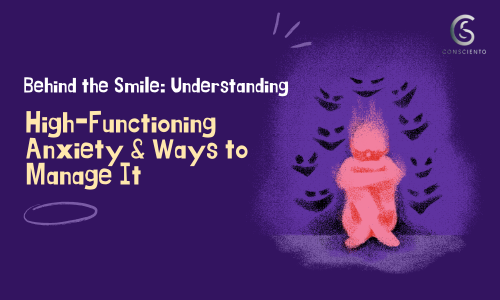Introduction
When we hear the word anxiety, most of us imagine someone who is nervous, restless, or maybe having a panic attack. But anxiety doesn’t always look that way. Sometimes, it hides behind a smile. Behind good grades, meeting deadlines, and always being “on time.” This is what many people call high-functioning anxiety.
It’s not a medical term or a diagnosis, but it’s a way to describe people who live with constant worry or stress yet seem to have everything under control. They show up every day, do their work, care deeply, and even succeed. But inside, they feel tired, anxious, and sometimes even lost.
Their anxiety often pushes them to do more, be better, and never stop. It becomes their fuel. But that pressure builds up quietly. And since they look “fine” from the outside, no one notices. Sometimes, they don’t.
In India, about 3.3% of people, that’s nearly 45 million, live with anxiety disorders. Sadly, many don’t get the help they need. A lot of them are young students, working professionals, and even homemakers, carrying silent stress every day. During COVID, when everybody was sealed into their homes, anxiety cases rose by 35%, showing how deeply this affects us.
This blog is for everyone who feels they are always “holding everything together,” but deep down, it’s difficult to manage. Let’s talk about what high-functioning anxiety really looks like, why it happens, and how we can manage it gently and without judgment.
What Is High-Functioning Anxiety?
You won’t find the term high-functioning anxiety in medical textbooks or even in the DSM-5 (the book doctors use to diagnose mental health conditions). That’s because it’s not officially a diagnosis, but that doesn’t make it any less real.
For many people, high-functioning anxiety feels like a constant inner worry that never fully goes away, even when everything looks fine on the outside. These are the people who show up early, meet deadlines, seem calm, and are always helping others. But deep down, they might be feeling overwhelmed, restless, or even stuck in a cycle of overthinking.
Unlike typical anxiety, which can visibly affect someone’s day-to-day life, high-functioning anxiety is quieter. It hides behind success. Instead of freezing or withdrawing, people with high-functioning anxiety often push themselves harder. They overachieve. They appear confident but might be battling self-doubt all the time.
Even though this kind of anxiety isn’t labelled as a mental illness, many people relate to it. And that matters. Just putting a name to what they’re going through can make someone feel seen, like, “Yes, this is what I’ve been feeling all along.”
Understanding high-functioning anxiety helps us realise that not all struggles are loud. Some are hidden behind a smile, and they deserve just as much care and compassion.
Signs You Might Be Dealing With Unknowingly
High-functioning anxiety doesn’t always look like anxiety. It often hides behind a smile, a packed to-do list, and a “you’re doing great” from others. On the outside, you may seem calm, organised, and totally in control. But from the inside, things might feel quite different. If you have ever gone through this, you need to hear this. Here are some signs that you might notice:
● You worry a lot. Even the smallest decisions can feel big. Your mind is always thinking of “what if” scenarios, and it’s hard to stop.
● You overthink every situation. You replay conversations again and again, wondering if you said something wrong. Even a simple “seen” message can make your heart rhythm abnormal.
● You’re struggling to sleep. You may be physically tired, but your thoughts just won’t stop. Your brain keeps revisiting the past or planning every little detail of tomorrow.
● Your body feels tight. You might have frequent headaches, tense shoulders, or an uneasy feeling in your chest even if nothing seems “wrong.”
● You can’t slow down. Being busy feels safer than being still. Whether it’s work or personal life, you are constantly moving, even when you are drained.
● You aim for perfection. You check everything twice. You hold yourself to impossible standards, and even then, you feel like it’s not enough.
● You fear messing up. One small mistake can feel like the end of the world. While others may not notice it, you beat yourself up for days.
● You struggle to say no. You want to be there for everyone, and you usually are, even if it means putting yourself last.
Sound familiar? If you see yourself in some (or all) of these signs, know this: you are not weak, dramatic, or “too sensitive.” You are human. And becoming aware of these signs is a powerful first step toward taking care of yourself.
What Causes High-Functioning Anxiety? And How It Affects You Inside and Out.
High-functioning anxiety doesn’t just show up one day. It often builds over time, shaped by our past, the world around us, and the pressure we silently carry daily.
Let’s take a gentle look at where it may come from and how it can affect us, not just mentally, but physically and emotionally too.
● Childhood experiences: Maybe you grew up in an environment where love was tied to achievement. Good grades, good behaviour, and being the “good child” these things made you feel seen and safe. So, somewhere along the way, you learned to link your worth with performance.
● Perfectionism: You set incredibly high standards for yourself, and anything less feels like failure. This mindset doesn’t come from arrogance but from a deep desire to feel in control, accepted, and enough.
● Pressure to succeed: Whether it’s school, work, or relationships, you push yourself hard. You don’t want to disappoint others. And even when you achieve something, you quickly move on to the next goal without pausing to celebrate.
● Social expectations: Especially in cultures like ours (hello, India!), there’s often an unspoken rule to “keep it together.” Smiling through stress, not talking openly about mental health, and being the “strong one” become a way of living. But carrying that weight silently can feel heavy, really heavy.
How does it affect you?
● Mentally: You may feel constantly on edge. Your mind might race with endless thoughts, overanalysing every detail. You could struggle to focus or feel exhausted even after a full night’s sleep.
● Physically: Anxiety doesn’t just live in your head. It shows up in your body too. Tension in your shoulders, stomach issues, fatigue, headaches, or that tight feeling in your chest, it’s all connected.
● Emotionally: You may feel overwhelmed, yet numb. Confident one moment and deeply insecure the next. You are functioning, sometimes even thriving, but beneath that surface is a quiet storm that never really stops.
Learning to Spot Your Triggers and Risk Factors
Sometimes, anxiety doesn’t shout, it whispers through patterns we have gotten used to. Recognising what triggers your anxiety is one of the most important steps toward managing it. Because once you see it, you can start to work with it instead of against it.
Here are a few common triggers and risk factors that might silently provoke high-functioning anxiety:
● Fear of disappointing others: Maybe you have always been the dependable one. The idea of letting someone down, even slightly, feels unbearable. So you say yes, even when your heart says no.
● Past criticism or failure: One negative comment from the past might still echo in your mind today. That fear of failing again pushes you to keep performing, even when drained.
● Overpacked routines: Staying busy can feel like a way to stay in control. But constantly rushing from one thing to another leaves little room for rest, reflection, or breathing space.
● Unrealistic self-expectations: You set the bar so high for yourself that anything less feels like you have fallen short. Even when others are praising you, you might still feel like you are not doing “enough.”
● Social comparison: Whether it’s on social media or among friends, comparing your journey with someone else’s can quietly chip away at your peace of mind.
Being able to identify your own personal triggers doesn’t mean you are weak. It means you are becoming aware. And awareness is the first step to healing. You don’t need to fix everything at once. Just start by noticing. Be kind to yourself when these patterns show up. You are learning, unlearning, and growing, and that’s incredibly brave.
Healthy Ways to Cope With High-Functioning Anxiety
Let’s be real, high-functioning anxiety can feel like a constant inner race. You look like you have got it all together, but inside, it’s just noise that doesn’t stop. The good news? You can manage it. You don’t have to wait for everything to fall apart before you give yourself permission to pause, breathe, and reset.
Here are some gentle, effective ways to ease that internal pressure and build a calmer headspace, day by day.
-
Start with a breathing exercise
Anxiety makes you worry about what’s next. But your breath brings you back to what’s happening right now. Inhale slowly for 4 seconds, hold for 4 seconds, and exhale for 4 seconds. Repeat this 4-4-4 pattern a few times. This simple reset can quiet the mental storm, even if it’s just a little. -
Talk with a professional
Therapists are not just for big problems. They help you understand the patterns behind your overthinking, people-pleasing, and fear of failure and give you solutions to shift those habits more healthily. A few sessions can go a long way. -
Protect your peace by creating boundaries
Saying “no” isn’t rude. It’s a way of saying “yes” to your well-being. Whether it’s fewer social obligations or logging off work on time, small boundaries help stop anxiety from coming up. -
Be alert to what triggers your anxiety
Too much caffeine or sugar can be harmful to your nervous system. If your heart beats faster after your second cup of coffee, try switching to herbal tea or warm water with lemon. Tiny changes can make a big difference. -
Be gentle on your body
You don’t need a gym membership. A walk, a stretch, a dance to your favourite song. Moving your body helps release tension stored in your muscles and mind. -
Write or say your problems instead of holding them in
Keeping everything inside can make you feel even more stressed and overwhelmed. But talking to someone you trust or writing your thoughts in a journal helps lighten the load and makes you feel better.
A Note on Medication
Sometimes, managing anxiety means considering all options, including medication. If anxiety feels like it’s taking over your life, talk to a mental health professional. Medication is not a weakness. It’s one more tool to help you get back to yourself. And it’s always okay to ask questions and find what feels right for you. So breathe, be kind to yourself, and remember: anxiety may be part of your story, but it doesn’t get to write the whole book.
Conclusion: Choosing Healing is Better Than Hiding
High-functioning anxiety often walks beside us, going invisible behind achievements, busy schedules, and plastic smiles. But just because you have learned how to function through the chaos doesn’t mean you should have to. You deserve to feel calm instead of appearing calm.
At Consciento, we understand how difficult this experience can be. You might be the dependable one, the planner, the solution maker, always available for others while quietly carrying your worries. And while those qualities reflect your dedication and perfectionism, they shouldn’t cost your peace of mind.
This journey is not about becoming someone else. It’s about creating space to breathe, pause, and simply be you. When you start understanding your anxiety, instead of judging or ignoring it, you begin to take back control in the most powerful way with compassion.
Whether you are here to find support, clarity, or relief, we are here for you. Through personalised care, evidence-based therapy, and a safe, non-judgmental space. Consciento offers more than just mental health services. We offer a connection, understanding, and a path that feels doable.
You don’t need to have all the answers today. Just a willingness to explore what healing could look like for you. Because healing doesn’t mean you stop being high-achieving. It just means you stop suffering in silence. Let’s walk this journey together, one step, one breath, one breakthrough at a time.
References
-
National Mental Health Survey of India (2016) – Ministry of Health and Family Welfare, Government of India. [https://main.mohfw.gov.in]
-
World Health Organisation (WHO) – Depression and Other Common Mental Disorders: Global Health Estimates. [https://www.who.int/publications/i/item/depression-global-health-estimates]
-
Lancet Study on COVID-19 and Mental Health (2021) – Increase in global prevalence of anxiety and depression. [https://www.thelancet.com/]
-
American Psychological Association (APA) – Understanding anxiety disorders and their manifestations. [https://www.apa.org/topics/anxiety]
-
Psychology Today – “What is High-Functioning Anxiety?” [https://www.psychologytoday.com/us/blog/anxiety]






